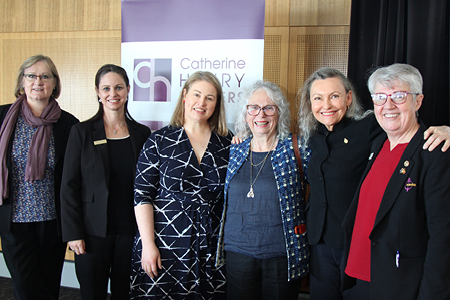More than 70 locals gathered at a forum during Women’s Health Week to discuss how the law can support women’s health.
At the forum a new free eBook Your Body Your Health: A legal guide to women’s health was launched. The community resource was written by women’s health lawyers at the Newcastle-based law firm, Catherine Henry Lawyers.
A panel of Hunter women discussed the challenges facing women in the area of health and what can be done to advance women’s interests, rights and outcomes. The panellists were Member for Wallsend Sonia Hornery MP, Maroba Aged Care CEO Viv Allanson, Victims of Crime Assistance League Newcastle CEO Kerrie Thompson, GP Specialist in Reproductive and Sexual Health Dr Phoebe Walsh and Oasis Solutions principal, former nurse and academic Dr Shirley Shulz-Robinson. The law firm’s principal Catherine Henry was the panel moderator.
Ms Henry said for three decades she has litigated cases for women experiencing poor or avoidable health outcomes. She has advocated for women whose health concerns have neither been taken seriously or ignored, lobbied for reform to health care rights such as informed birth choices and access to abortion and supported women who’ve had primary responsibility for aged parents bringing focus to unacceptable aged care practices.
“Our health law team see the whole gamut of health issues that women face,” Ms Henry said.
“We wanted to write a comprehensive guide – from before the cradle to grave – to help women know their legal rights in relation to health issues,” she said.
Topics covered in the book include abortion, contraception, pregnancy, childbirth, surgery, healthy ageing, chronic pain, sexual and other violence, mental health, making complaints, and aged care.
“The book has had a long gestation period because there is a lot of information to cover. We will continue to update it to provide a useful and comprehensive community resource.”
Ms Henry said women live longer and have worse health outcomes than men. They use the health system more than men. She said women have long battled misogyny in the healthcare sector and the legal system with women’s health issues and their impacts not taken as seriously as they should be.
“Women have historically been treated as guinea pigs by the medical industry with devastating consequences. Implants, hormone replacement therapy and vaginal mesh are three examples.”
The panel agreed that access to health and aged care is a major issue for women, particularly for women in regional and rural areas. Panellists listed: access to abortion, especially early medical abortion; mental health support, including for survivors of sexual or domestic violence; and a lack of health care workers and capacity of services in regional areas as some of the current problems.
Dr Shulz-Robinson said access to multi-disciplinary care via community health centres and mental health nurses has diminished. She said there needs to be a greater focus on providing culturally appropriate and gender-appropriate care.
“The casualisation of the health workforce made it difficult for staff to provide proper care to patients,” she said.
Ms Allanson said women were over-represented in caring for older people as family members and aged care services. She said while this task is rewarding, it can be a burden on women financially and on their own well-being. She called on governments and citizens to realise more funding for health and aged care is needed.
“We can’t keep doing the same thing and expect things to get better,” Ms Allanson said.
“As a society, we need to better look after people needing health and aged care and those who care for them,” she said.
The panel was unanimous on the question of what the audience and other community members can do to help improve women’s health. They agreed governments needed to invest more in services and pay attention to what frontline services and staff say are the problems and solutions. There needs to be more studies into adverse events and more public reporting of data on those events and other aspects of health care.
“When things go wrong it is the person on the frontline who is blamed but the issue is often systemic,” Dr Shulz-Robinson said.
Ms Hornery encouraged people to make their views on health and aged care known rather than saying nothing. She said people should make representations on specific matters to health care providers and politicians.
“Make some noise,” Ms Allanson said. “You will all need to use these services one day.”
The forum was held at Fort Scratchley on September 8. The eBook is available for free here.
Catherine Henry Lawyers specialises in health law and aged care and elder law advice and representation for people in regional NSW. Ms Henry and the firm are consistently recommended in the Doyle’s Guide list of top medical negligence firms and practitioners. The firm was also named Regional/Suburban Law firm of the Year in the 2021 Australian Law Awards.
This article appeared on the Newcastle Weekly website on 9 September 2022.




